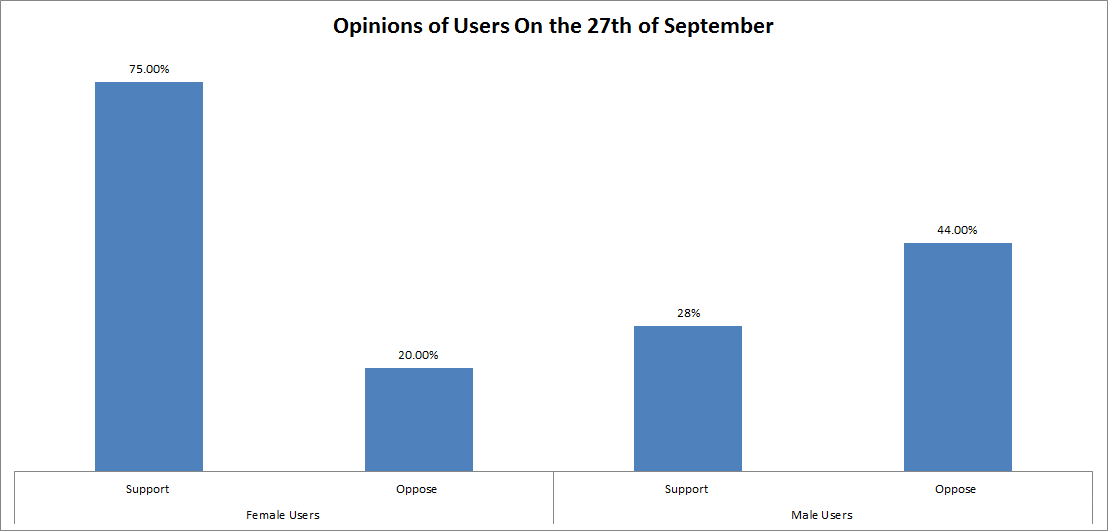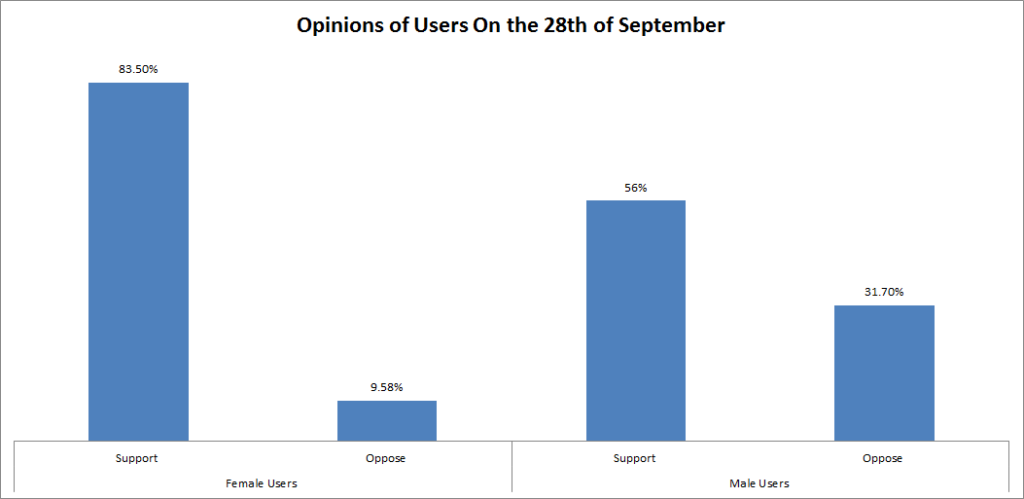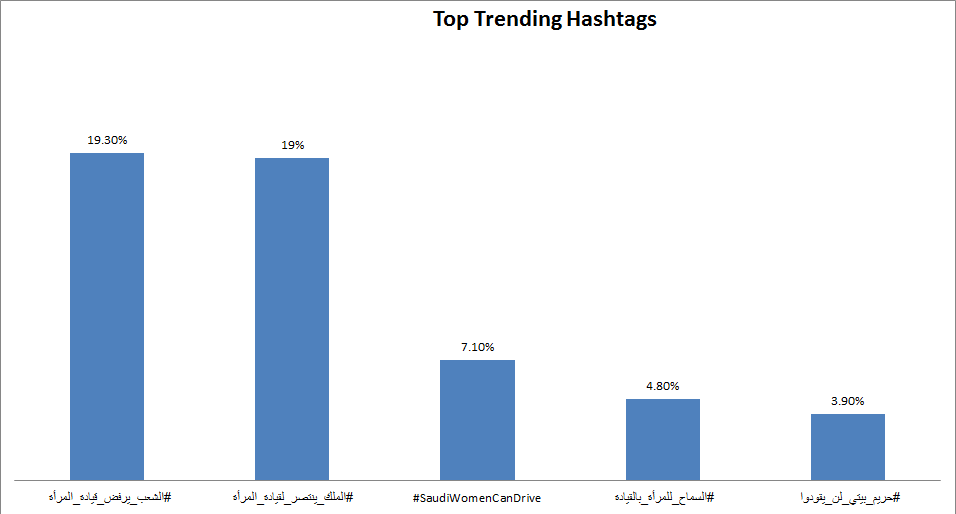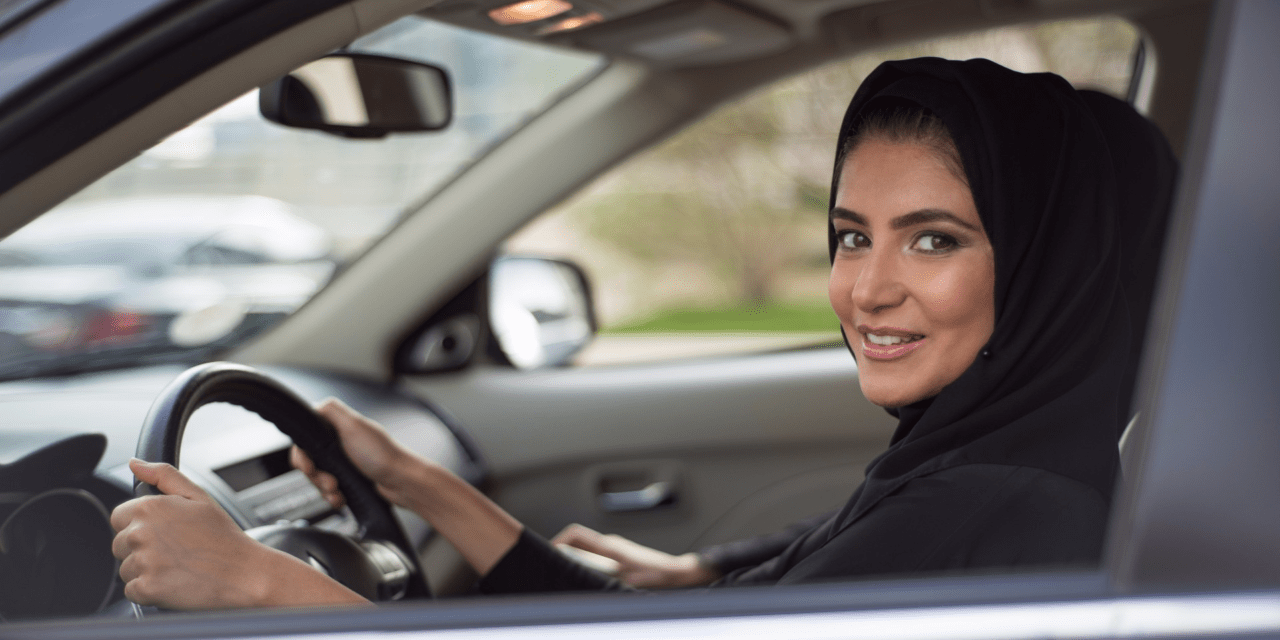It’s the start of a new era. Women in Saudi Arabia have been finally granted the right to drive. We assume some are singing Hallelujah! We have to stop for a second here and measure the feedback of this resolution. Thank god the Saudi nation is a very expressive one on social media; we can know how people reacted to the decision.
Males vs Females
Since this decision mainly affects women, we had to monitor the feedback of females compared to males in Saudi Arabia. We realized that the percentage of women objecting the order was much higher than what is expected. As shown in the chart below, we categorized content relative to the user’s stance regarding the decision. We analyzed tweets by both genders to come up with the following insights.

On the second day, things changed a little bit. Men slightly became more fond of the decision. The change in sentiment was great. According to our analytics, more than 50% of males’ tweets expressed their happiness with the new law, compared to 28% on the first day.

How and why did people object?
It’s obvious, people are upset because of cultural and religious reasons. Many who adopted the cultural motives posted pictures of the late Prince Nayef Al Saud who apparently implied that women should not drive, and those who claim to ask for their liberty are seeking the liberty of reaching out to women.
#قيادة_المراة_السعودية
اسمعو واعوو
هذا ما قاله الأمير نايف ابن عبدالعزيز لا أنا pic.twitter.com/3t9xug02BJ— عمر العنزي (@3mr_al3nzi) September 27, 2017
On the other hand, some retweeted the celebrations of the national day to show that this is a pattern planned by “the west”. The national day’s celebration was very controversial for being the first mixed celebration ever.
#الشعب_يرفض_قياده_المراه_2#الشعب_يرفض_قياده_المراه
يكفي ماحدث في اليوم الوطني
غابت الهيئةفخرج أقذرالناس من جحورهم
إلى أين ياقبلةالمسلمين!— امووولهـ (@Sx032) September 28, 2017
Trending hashtags
At the beginning, the most trending hashtags were clear objections to the decision made. For instance, the top ranking hashtag translates into ‘The people object women driving’, followed by a hashtag ‘The king supports women driving’.

Influencers!
The top influencer with the largest number of followers is The New York Times with more than 30 Million followers. While the most interactive post by an individual, which received more than 1500 interactions, was a removed one by Suleiman Al Eseiry. Thanks to Crowd Analyzer’s access to raw real-time data even after the removal of the content, we took a screenshot of the tweet.

Brands and Business Accounts
As expected, most of business accounts shown in the analysis are actually news channels. Since the decision of allowing women to drive is huge news, it was covered by most regional and international news agencies. You would expect automotive companies to seize the opportunity and brand for their own cars, but their participation in the buzz wasn’t as big as it should be.
Ford and Volkswagen published nice and simple ads that received considerable interactions by online users.
نفخر بمشاركة أخواتنا في المملكة العربية السعودية فرحتهن، جعلهنّ الله خير عون لأبناء الوطن على رفعته. #إنتي_قدها pic.twitter.com/J6GVJ64gg3
— Ford Middle East (@FordMiddleEast) September 27, 2017
Clerics and Religious Authority
As many opposers resorted to verses of the Quran and Fatwas that were used to prohibit women from driving, many religious figures and entities tweeted in support of the resolution including The Council of Senior Scholars.
في #بيان#الأمانة_العامة_لهيئة_كبار_العلماء توضح الأسس الشرعية في السماح لقيادة المرأة للمركبة. https://t.co/t9KAK7NpcU pic.twitter.com/kVMeevZqtG
— هيئة كبار العلماء (@ssa_at) September 27, 2017
Some online users criticized the surprising change in the religious authorities’ stance by expressing their disappointment.
قال تعالى(وقرن في بيوتكن ولا تبرجن)
قال نبينا (كلكم راع وكلكم مسؤول عن رعيته)
يا علماء السلطان ويلكم من رب العباد— العالم الافتراضي (@Wm1ybHFyrmGn0ry) September 27, 2017

























